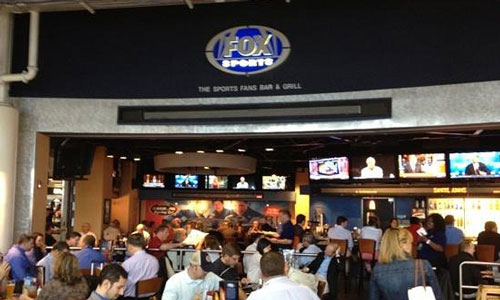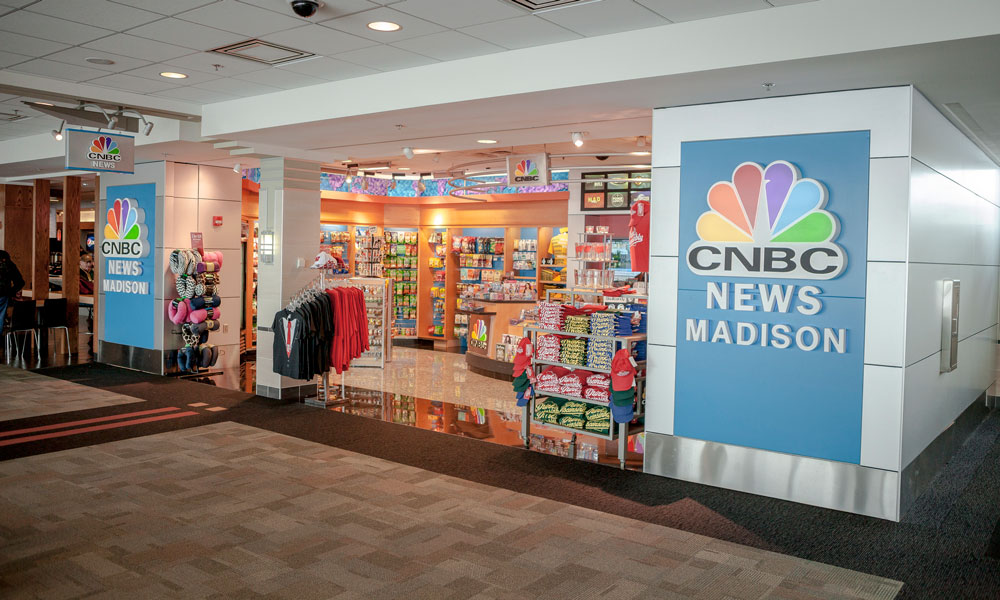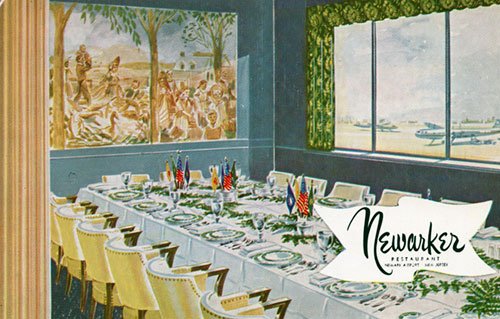Network Effects
For more than a decade, it's been a common sight in U.S. airports to see newsstand-style shops named for cable news networks. Why, of all things, this idea?
Hey all! In lieu of a new piece, tonight’s Tedium is a lightly updated classic edition discussing one of the weirdest phenomena you’ll see at the airport: The naming conventions of the stores. Admit it, you’re curious.
Sponsored By … You?
If you find weird or unusual topics like this super-fascinating, the best way to tell us is to give us a nod on Ko-Fi. It helps ensure that we can keep this machine moving, support outside writers, and bring on the tools to support our writing. (Also it’s heartening when someone chips in.)
We accept advertising, too! Check out this page to learn more.
90M
The number of consumer transactions that Hudson Group has at its various stores in an average year, according to Skift. The firm, which started in the 1918 as a magazine distributor, moved into airport newsstands in the ‘80s, with a LaGuardia Airport location being the first. Now, the company is in 60 airports in the U.S. and Canada.

(via TripAdvisor)
Why are so many airport stores named after television networks?
I have this memory from a decade ago of a plate of nachos so disturbing that I wasn’t sure what to do with them.
Like a Guy Fieri fever dream that lingers years after the fact, they were huge, loaded with a level of nourishment that no one human being should ever be able to eat. It was like someone took the giant plate of nachos you would get at a sports bar and then doused them with steroids, just to make them bigger and more imposing.
This plate of nachos, which I immediately regretted purchasing, came into my purview thanks to the fact that I had a transfer out of Charlotte’s airport—and found myself at the airport’s Fox Sports Bar & Grill.
(It’s weird seeing giant pictures of Howie Long, Terry Bradshaw, and James Brown staring down as you as you’re trying to rush through a meal.)
Now, this restaurant, which has since closed, isn’t unique to the airport experience—there’s another location in San Diego, for one thing—but its naming convention is far from uncommon in the microcosm of airport society.
Fox Sports’ popular cable cousin, Fox News, offers the namesakes for Hudson News-style airport stores in a few cities, including Houston and Minneapolis.
CNN may constantly lose to Fox News in the ratings, but it wins on the airport retail front: The company has at least two store locations in Hartsfield-Jackson Atlanta International Airport, as well as locations at airports in Orlando, Chicago, Pittsburgh, Los Angeles and Orange County, California.
Heck, even Univision is getting in on the branded airport store game.
But what might be surprising to cable viewers is that the TV network that the straight-up champion of this unusual business model is CNBC, a network that is so ineffective from a ratings standpoint that it had to drop Nielsen back in 2015 out of concerns the ratings firm was improperly measuring its offering.

(Dane County Regional Airport/Flickr)
CNBC’s right-place-right-time path to airport domination
Why CNBC? To put it simply: they were early, it made sense from a marketing standpoint, and they found just the partner to work with.
In December of 2001, the Paradies Shops announced a plan to team with the network to open up a number of CNBC-related shops in airports around the country over a three-year period. The deal gave Paradies—which, at this point, owned 300 specialty stores—a strong brand so it could compete with the then-surging Hudson News. Paradies was so bullish about the deal that they decided to rebrand some of their existing stores with the CNBC name.
“We are very excited to be a partner with this highly respected and recognized brand,” Gregg Paradies, then Paradies’ COO, said in a 2001 press release. “CNBC is the leading global brand in business news and analysis. The demographic profile of the CNBC viewer and the business traveler is a perfect fit for our airport operation and we believe that our CNBC News operations will become a ‘destination’ for our frequent travelers.”
The idea—which, as you might guess, emphasized the business network in a number of ways—was so good that not even the 9/11 attacks that year could stop the idea from taking shape.
The first CNBC location opened in Kansas City in 2002, and from there, they grew like weeds—as of 2008, CNBC had 75 stores, or one for every viewer. (Kidding!) Soon, Paradies was replicating the idea with the help of The New York Times.
Hudson, the big name in the airport retail space, soon got on the trend itself, bringing on CNN as a client. In comments to the Associated Press in 2008, Hudson spokeswoman Laura Samuels noted that such stores were particularly attractive for news channels due to the high-value demographics of those customers.
Additionally, it has a lot of advantages over traditional advertising approaches for newspapers or networks, because it doesn’t get in the way of coverage.
“Airport travelers are a unique customer set, with an unusually high demographic of age and income,” Samuels told the Associated Press. “These are people who thrive on information.”
(It should be noted that the story came about as USA Today was launching its airport retail stores in Detroit.)
You can’t convince people to buy your magazines or watch your TV shows? Considering selling them a couple of Twix Bars and a SmartWater instead.
28%
The increase in Hudson Group's stock price since its public trading debut in February, according to The Motley Fool. The growth of Hudson, a fairly iconic chain of airport convenience stores, comes as airports around the U.S. and beyond upgrade their infrastructures. New York’s LaGuardia Airport, which Joe Biden infamously compared to a “third world” airport while he was vice president, has seen significant upgrades, which are largely intended to to improve the airport’s reputation and encourage an increase in retail sales.

Five notable airport restaurant facts
- The first airport restaurant on record, based on all the digging I could do, was the Sky Room, a swanky restaurant located in Burbank’s airport. The airport, during its early years, attracted much of the Golden Age of Hollywood crowd, and likewise so did the Sky Room. “There was always somebody famous at the airport,” Charles August Bausback, the son of the Sky Room’s original owner, told the Los Angeles Times in 2000. “The stars wanted to be seen where the action was and it was a happy hunting ground for news photographers, who came out here on a regular basis.”
- The subgenre of airport restaurant food is not one that’s known for breakout hits, really, but in the 1950s, Newark International Airport had one of those. Joe Baum, a famed restauranteur who later became known for his work with The Four Seasons Restaurant and Windows on the World, launched a restaurant at the airport called The Newarker. NJTV notes that the fairly opulent restaurant at one point was so popular that 90 percent of its customers weren’t even traveling.
- Chipotle, as a general rule, doesn’t serve breakfast at its many restaurants, but rules are made to be broken. In two Washington D.C.-area airports, the company was contractually obligated to be open during breakfast hours at those locations, so it tried adding a little egg and potato to its meals. They weren’t impressed with the results, however, so they threw that idea out of the window.
- Commercial airports don’t have a monopoly on restaurants. The Atlanta-area DeKalb Peachtree Airport, which is known for amateur pilots and airshows, has two restaurants, one of which is WWII-themed.
- Also in the Atlanta area, however, is a James Beard-nominated airport restaurant, One Flew South. The concept of an upscale dining facility in an airport has been tried before, obviously, but has been gaining fresh interest in recent years. Problem is, the restaurant and other similar high-end spots have run into staffing problems caused by the location and the requirement to go through an expensive TSA screening process for new employees.
“This appears to be a squabble between two retail groups, but we’d be remiss if we didn’t take this opportunity to remind everyone that retail at U.S. airports almost always [are defined] by the worst combination of local politics, nepotism, and the shadiest of contracts, as well as a complete disregard for the consumer.”
— Skift writer Jason Clampet, responding to an odd lawsuit between Hudson Group and Kitson Stores, a boutique department store chain known for attracting rising celebrities. During the legal battle, Hudson was accused of overcharging airport patrons for water—around $5 a pop, to be exact, or roughly twice as much as Kitson asked them to charge. Hudson’s attorney, Brian Timmons, accused Kitson of hypocrisy, noting the chain’s own high prices. The legal battle ultimately highlighted deeper issues for Kitson, which announced it was closing its entire chain of stores last year.
As dumb as the lawsuit above was, it nonetheless highlights two useful points: One, people love their water (it’s the most purchased item by airport consumers, according to Hudson Group research), and two, airports very naturally offer a “captive audience” for many retailers, who aren’t afraid to jack up their prices to take advantage of this market disparity.
Part of the reason for this, according to a 2012 Clear Channel Airports survey, is that the audiences that go through airports tend to be demographically attractive, and those consumers tend to buy things they don’t need, so they get advertised to a lot more.
“This study identifies a consumer demographic that spends time and money engaging with airport advertising and is very receptive to new products and services,” the study, which describes humans in the most inhumane terms possible, states. “The study is clear: airports deliver high returns for advertisers.”
The potential to jack up prices in this way is very tempting, but not every retailer or restaurant does it, to be fair. For example, Portland, Oregon’s airport straight up bans that kind of activity.
“For us, street pricing is the right thing to do,” PDX airport spokesperson Kama Simonds told The Points Guy. “Travelers are happy, they are eating good meals and purchasing quality products—all while paying a fair price.”
If airports as a whole stopped charging passengers extremely high prices that’d be breaking news, indeed.
:format(jpeg)/2017/06/tedium081616--1-.gif)
/2017/06/tedium081616--1-.gif)


/uploads/ernie_crop.jpg)